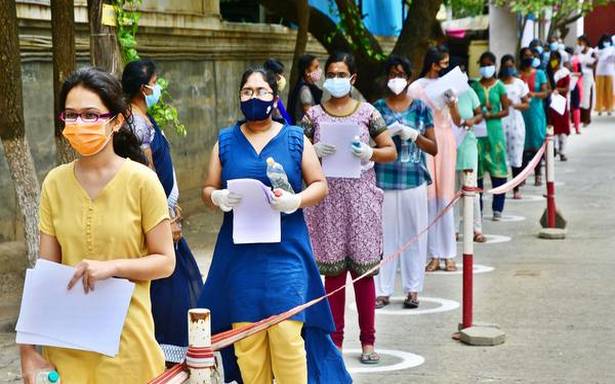The policy of a single test needs to be reviewed to attain the lofty goals of the New Education Policy
A revived debate
In accordance with the DMK’s electoral promise of promoting equity in medical admissions, Tamil Nadu Chief Minister M.K. Stalin, constituted a high-level committee under the chairmanship of retired Madras High Court judge, Justice A.K. Rajan. After the High Court had dismissed a petition by Bharatiya Janata Party (BJP) State Secretary K. Nagarajan against the constitution of this committee, the DMK government moved with god speed and got the law against NEET passed by the State Assembly. Of course this law will not be able to help students as the President of India is unlikely to give his assent to it as the BJP had opposed it. Yet, the enactment of this law has succeeded in reviving the debate about the usefulness of NEET. While medical education is on the Concurrent list (Entry 25), it is subject to the maintenance of standards in higher education which is within the domain of the central government under the Union list (Entry 66). In any case, the field is occupied by the central law namely Section 14 of the National Medical Commission Act, 2019 that provides for NEET. NEET is a unique system of admission as no admission in medicine is possible in India without clearing NEET. The idea of common tests was initiated by Murli Manohar Joshi as the HRD Minister in the A.B. Vajpayee government. It found some support in the judgment of the Supreme Court in T.M.A. Pai Foundation (2002). NEET was notified by the Medical Council of India (MCI) in 2010 but in 2013, a three-judge majority decision in Christian Medical College Vellore Association vs Union of India and Others had struck down NEET. The decision was widely criticised as being pro-rich, for pro-coaching centres, and anti-student and one which would lower the standards of medical education. As a result, the Indian Medical Council Act, 1956 was amended and Section 10D was inserted to empower the MCI to conduct NEET. Moreover the review petition against this judgment was allowed in 2016 and the Supreme Court ordered the conduct of NEET from 2016 itself.
The Justice Arun Mishra-led Bench in 2020 again upheld NEET even in respect of minority institutions. Article 30 gives them the right to admit students of their choice. ‘Choice’ cannot be limited just to the right to reservation. Each university or institution has a right to emphasize some special areas of study. For instance, the Gandhi Medical College, Seva Gram, Vardha, had a paper on Gandhian Studies in its test. Similar was the case with the Armed Forces Medical College which used to test a student in defence studies.
Instances of alleged question paper leakage in the very first year of NEET, media reports of unfair means and examination malpractices by students show that both NEET as well as JEE are not fool-proof tests satisfying the parameters of fairness and transparency.
Moreover with just one national test, commercial coaching institutes are bound to prosper. And since most coaching centres are in the cosmopolitan and big cities, poorer students from a rural background, and who have studied in the vernacular medium, would always be at a disadvantage in any ‘one nation-one test’ policy. There is also large-scale variation in syllabus when it comes to the CBSE and State boards. Wrong translation of questions including in Tamil had also been a problem. If unequals are tested on the basis of one test, i.e. NEET, the mandate of equality is violated as Article 14 demands likes are to be treated alike, not unlikes are to be treated alike. Thus, it goes against the Preamble as it does not provide equal opportunity to all. What it basically achieves is just ‘formal’ rather than ‘substantive equality’ as it overlooks differences.
The greatest argument in favour of NEET is judicial belief about the promotion of merit though without any clarity on the meaning of merit. The reality is that many private colleges even after NEET do admit students under Non Resident Indian and management quota on extremely low scores i.e. much lower than the scores of Scheduled Caste, Scheduled Tribe and Other Backward Class categories.
Editorial | Tamil Nadu’s case against NEET
Merit requires fair competition and equality of opportunity. Is it not a fact that the central government and judges sincerely believe that the multidimensional construct of merit can be adequately, if not accurately, measured? When NEET does not satisfactorily meet this fundamental criterion, competition cannot be termed as fair and just, and the equality of opportunity becomes illusory. There is substantial scholarship in the West (Sacks, Freedle, Wells, Camara and Schmidt) that common admission tests cannot measure abilities that are essential for learning such as imagination, curiosity and motivation. NEET does not test qualities that a doctor must possess such as compassion, empathy and passion to serve humanity. Accordingly hardly any doctor is willing to serve in rural areas. NEET toppers won’t necessarily make good doctors.
While the Tamil Nadu government should try to improve educational standards of its schools, the NEET syllabus should not be based entirely on CBSE. The central government too should review the policy of a single test so that diversity of the society is reflected in our medical institutions and the goals of the New Education Policy — of equity, inclusion and access — are realised.
Faizan Mustafa, an expert of constitutional law, is the Vice-Chancellor of the NALSAR University of Law, Hyderabad. The views expressed are personal
Source: Read Full Article

